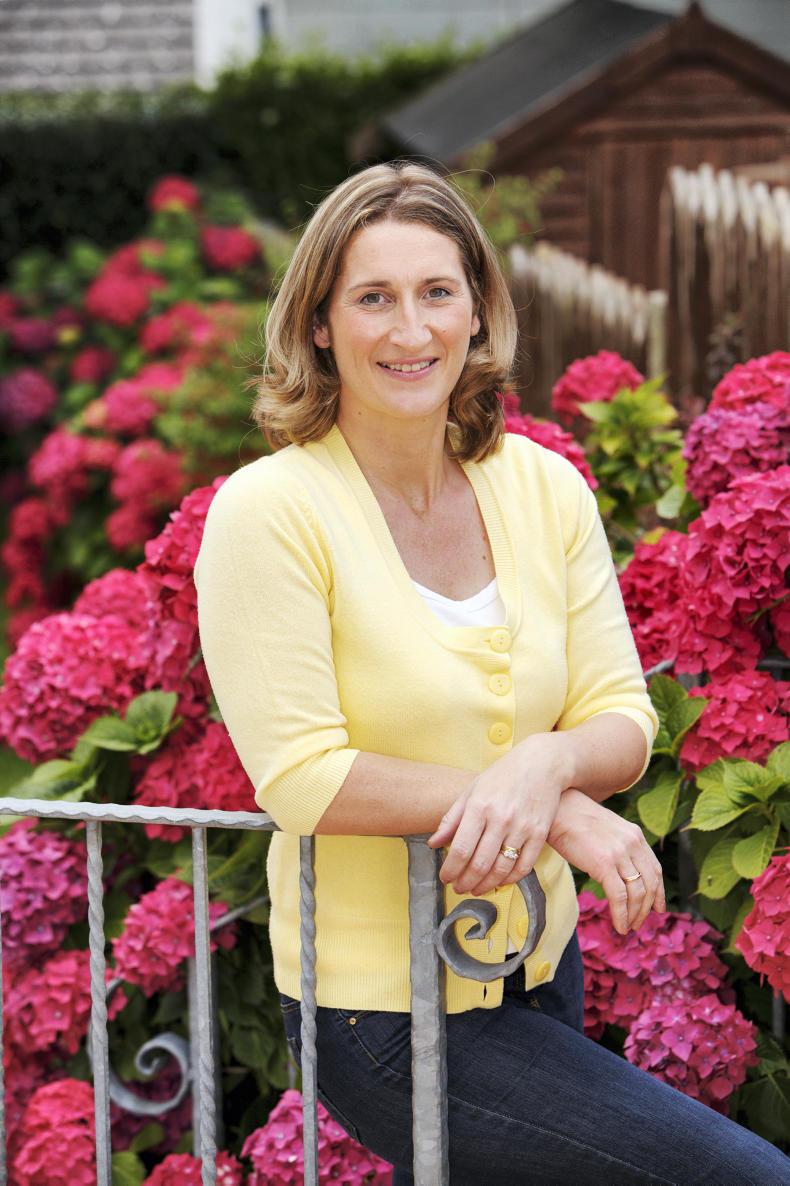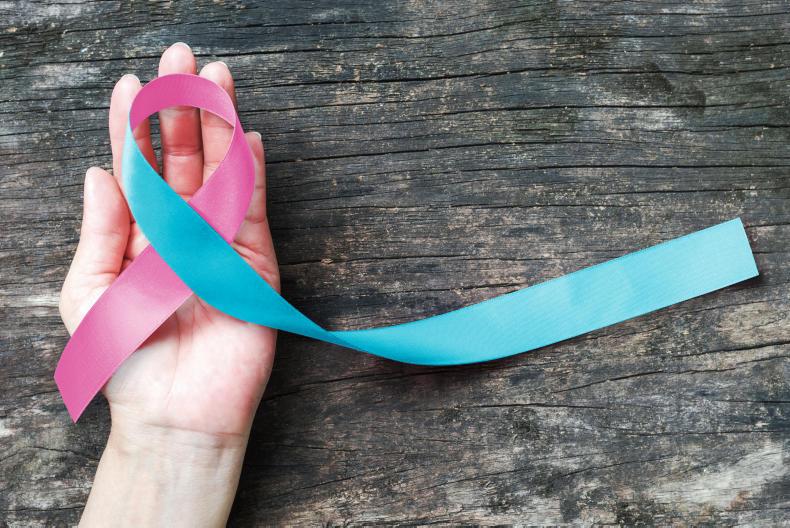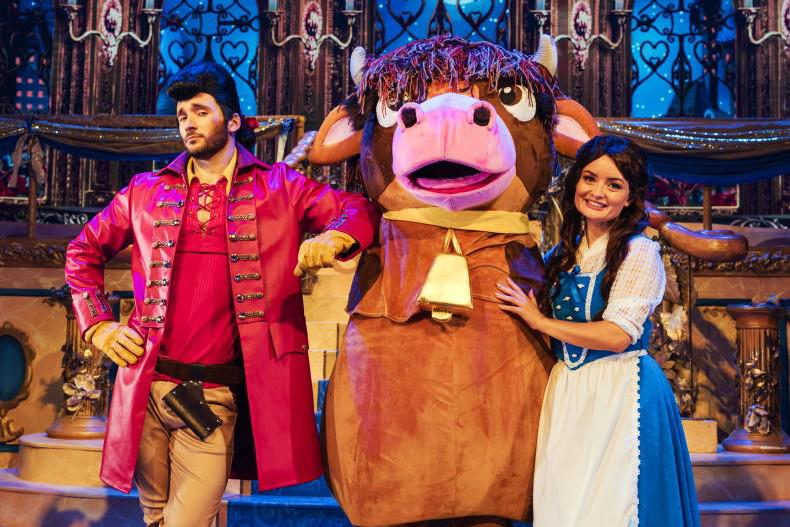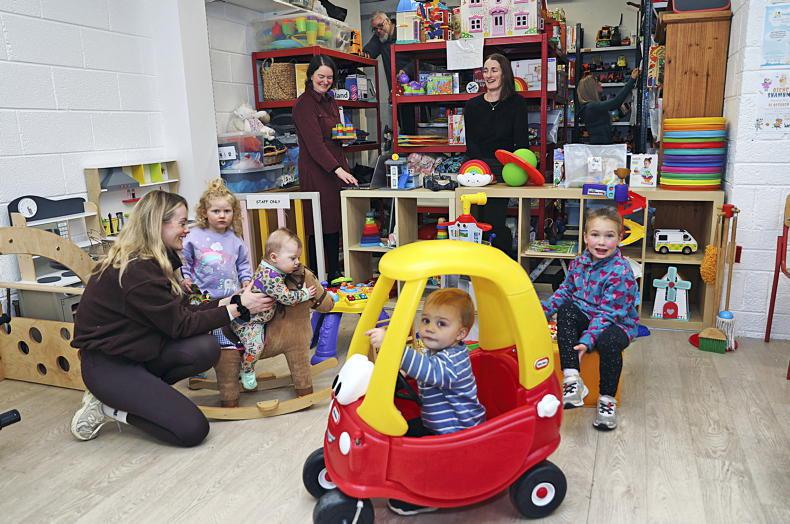Caroline lives near Rosscarbery with her husband, Batt, and children, Billy (15), Kaitlin (14), Callum (10) and Isabelle (8).
“I talk to Leah all the time. She is always in the back of my head. On my shoulder. In my heart. I feel her spirit. I know she’s there.
“Leah was very much a wanted baby. It was my fourth pregnancy. We were building a house and there was a lot going on, but I didn’t ever imagine there would be a problem. You just think you can sail through.
“For a few days I hadn’t been feeling particularly well, but nothing that would screech out at you. Swollen ankles are quite normal in pregnancy. Feeling tired is quite normal. You were checking for movement and then you’d feel something and think: ‘I’m just being silly.’
“But after a few days of that I said: ‘I just need to go and get checked out.’ I will never forget lying up on the doctor’s couch, waiting and willing for the room to fill with the baby’s heartbeat, because there’s nothing better than that sound. And it didn’t. But even when she said: ‘I need to send you to CUH.’ It didn’t sink in. Batt and I drove to the hospital together. We were saying: ‘It’s going to be fine. It’s going to be fine.’ And then they took us into a separate room, did the scan and said she was gone; and your whole world just crashes. Everything you thought was important, everything that mattered to you, doesn’t anymore.
“Then you have to go through the whole process of labour. Because I’d given birth before, you’ve got an understanding of what should happen. Usually that baby is born and the whole room fill with cries. And it’s just silence. It’s all so wrong; and yet no matter how much you will it, or how many deals you make with God, there’s nothing you can do.
“The only thing you can do is to go through it. And as much as I didn’t want her to be born dead, I still wanted her with us and all I wanted to do was to have her. Just to be able to hold her and talk to her and tell her just how terribly sorry we were that she wasn’t coming home.
“There was a naming ceremony in CUH and the hospital staff were amazing; but then you have to bury your child. I remember before the funeral thinking: ‘She’s going to be cold, she’s going to need a blanket.’ Even though logic would say she doesn’t need a blanket. But she did, and that was really important to me.
“In the early days, I could not see outside of our loss. Only for my family – especially my mother – picking up the pieces at home with the other kids, I wouldn’t have managed. My body believed I’d had a baby – but didn’t know she was gone – and that was very difficult. You’re angry, you’re upset, you’re devastated, you’re terribly sad, and then you go back to angry again.
“I was upstairs, because I couldn’t face the world, when my eldest daughter came up and gave me a picture. I just said: ‘That’s lovely pet.’ And she looked at me and said: ‘That was my last chance to make you smile again.’ And that was the moment when I realised I had a choice.
“On one side was Leah, darkness and blackness, and I just wanted for it all to engulf me, just to try and be with her – even though I know logically I couldn’t. And then on the other side were my other children, my life, my everything.
“I thought to myself: ‘I’m grieving my daughter who is gone, but I have a daughter here who needs me.’ That was the moment I made a choice, and my mother said I came down the stairs a different woman.
“But grief isn’t something I believe you can be cured from. Nine years down the line I can still feel myself in that hospital bed, I can still feel myself on that doctor’s couch and I could be 80 and I will still feel that.
“But there’s the Caroline there was before and there’s the Caroline now, and I firmly believe it had a huge impact on us for obvious reasons, but also for not so obvious reasons. To be there as a family and to have gone through that as a husband and wife has made us better people, better parents, a better couple.
“When I first lost Leah, speaking about stillbirth was very much taboo. People would cross the road because they didn’t know what to say. That was one of the reasons I decided to organise the Mass of the Angels, which is held every summer, and has very much kept Leah alive.
“It’s very emotional, but it’s also very therapeutic, because it gives you that hour just to remember. At the last mass, I couldn’t get over the amount of older gentlemen there and a lot of the time we would have women in their 70s and 80s whose loss would never have been acknowledged; but they don’t forget. We’ve all lost a child and that brings you together.
“Small acts of kindness mean a lot when you lose a baby. It might be a card from somebody that I may not have known very well who went through the same experience, or a text on Leah’s anniversary saying: ‘Thinking of you today.’ I’m very lucky I have friends and family who have seen me through the worst times; but we’re still here for the good times today and you have to appreciate that.
“For me, it’s important to talk about our babies because they are very much part of each and every family. Someone said to me that they came to do what they needed to do and then they just go. And that’s like all of us; they just didn’t get to spend 80 years on this earth.”

Caroline Murphy, West Cork Eggs, Rosscarbery, Co Cork. \ Donal O' Leary
Caroline lives near Rosscarbery with her husband, Batt, and children, Billy (15), Kaitlin (14), Callum (10) and Isabelle (8).
“I talk to Leah all the time. She is always in the back of my head. On my shoulder. In my heart. I feel her spirit. I know she’s there.
“Leah was very much a wanted baby. It was my fourth pregnancy. We were building a house and there was a lot going on, but I didn’t ever imagine there would be a problem. You just think you can sail through.
“For a few days I hadn’t been feeling particularly well, but nothing that would screech out at you. Swollen ankles are quite normal in pregnancy. Feeling tired is quite normal. You were checking for movement and then you’d feel something and think: ‘I’m just being silly.’
“But after a few days of that I said: ‘I just need to go and get checked out.’ I will never forget lying up on the doctor’s couch, waiting and willing for the room to fill with the baby’s heartbeat, because there’s nothing better than that sound. And it didn’t. But even when she said: ‘I need to send you to CUH.’ It didn’t sink in. Batt and I drove to the hospital together. We were saying: ‘It’s going to be fine. It’s going to be fine.’ And then they took us into a separate room, did the scan and said she was gone; and your whole world just crashes. Everything you thought was important, everything that mattered to you, doesn’t anymore.
“Then you have to go through the whole process of labour. Because I’d given birth before, you’ve got an understanding of what should happen. Usually that baby is born and the whole room fill with cries. And it’s just silence. It’s all so wrong; and yet no matter how much you will it, or how many deals you make with God, there’s nothing you can do.
“The only thing you can do is to go through it. And as much as I didn’t want her to be born dead, I still wanted her with us and all I wanted to do was to have her. Just to be able to hold her and talk to her and tell her just how terribly sorry we were that she wasn’t coming home.
“There was a naming ceremony in CUH and the hospital staff were amazing; but then you have to bury your child. I remember before the funeral thinking: ‘She’s going to be cold, she’s going to need a blanket.’ Even though logic would say she doesn’t need a blanket. But she did, and that was really important to me.
“In the early days, I could not see outside of our loss. Only for my family – especially my mother – picking up the pieces at home with the other kids, I wouldn’t have managed. My body believed I’d had a baby – but didn’t know she was gone – and that was very difficult. You’re angry, you’re upset, you’re devastated, you’re terribly sad, and then you go back to angry again.
“I was upstairs, because I couldn’t face the world, when my eldest daughter came up and gave me a picture. I just said: ‘That’s lovely pet.’ And she looked at me and said: ‘That was my last chance to make you smile again.’ And that was the moment when I realised I had a choice.
“On one side was Leah, darkness and blackness, and I just wanted for it all to engulf me, just to try and be with her – even though I know logically I couldn’t. And then on the other side were my other children, my life, my everything.
“I thought to myself: ‘I’m grieving my daughter who is gone, but I have a daughter here who needs me.’ That was the moment I made a choice, and my mother said I came down the stairs a different woman.
“But grief isn’t something I believe you can be cured from. Nine years down the line I can still feel myself in that hospital bed, I can still feel myself on that doctor’s couch and I could be 80 and I will still feel that.
“But there’s the Caroline there was before and there’s the Caroline now, and I firmly believe it had a huge impact on us for obvious reasons, but also for not so obvious reasons. To be there as a family and to have gone through that as a husband and wife has made us better people, better parents, a better couple.
“When I first lost Leah, speaking about stillbirth was very much taboo. People would cross the road because they didn’t know what to say. That was one of the reasons I decided to organise the Mass of the Angels, which is held every summer, and has very much kept Leah alive.
“It’s very emotional, but it’s also very therapeutic, because it gives you that hour just to remember. At the last mass, I couldn’t get over the amount of older gentlemen there and a lot of the time we would have women in their 70s and 80s whose loss would never have been acknowledged; but they don’t forget. We’ve all lost a child and that brings you together.
“Small acts of kindness mean a lot when you lose a baby. It might be a card from somebody that I may not have known very well who went through the same experience, or a text on Leah’s anniversary saying: ‘Thinking of you today.’ I’m very lucky I have friends and family who have seen me through the worst times; but we’re still here for the good times today and you have to appreciate that.
“For me, it’s important to talk about our babies because they are very much part of each and every family. Someone said to me that they came to do what they needed to do and then they just go. And that’s like all of us; they just didn’t get to spend 80 years on this earth.”

Caroline Murphy, West Cork Eggs, Rosscarbery, Co Cork. \ Donal O' Leary










SHARING OPTIONS